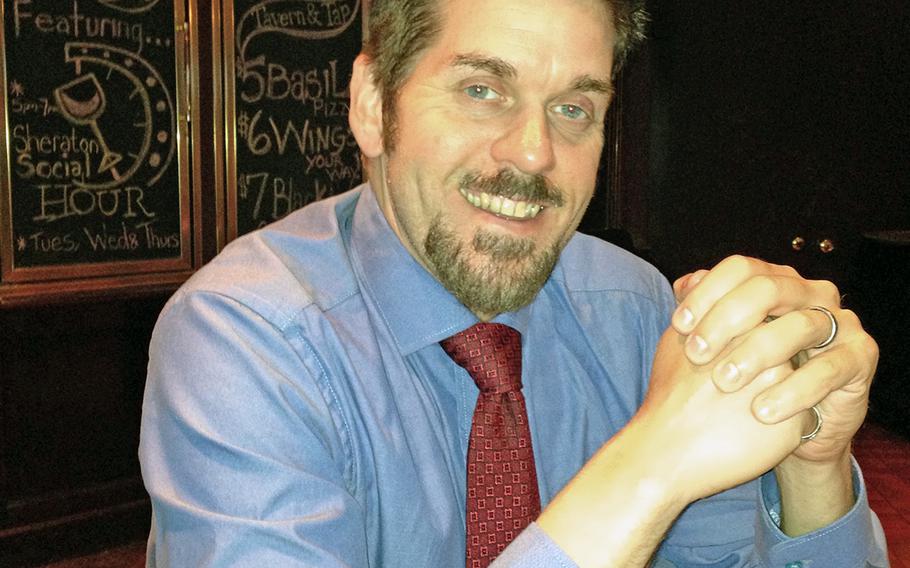
Jason Heap, an atheist who applied to become the military’s first humanist chaplain, learned in May the Navy had turned down his application. (Courtesy of Military Association)
WASHINGTON — Rebuffed by the military, atheists and humanists made their case Tuesday on Capitol Hill for chaplains to represent hundreds of thousands of troops who profess no religious faith.
The military chaplaincy has already made it clear that it doesn’t want to help troops who want support for spiritual quests that don’t involve belief in supernatural deities, former Army officer Jason Torpy told a roomful of Congressional staffers, so perhaps Congress can help.
“They don’t understand us and they don’t want to,” said Torpy, who now runs the Military Association of Atheists and Freethinkers. ”That is the message they are now sending — any service we receive will be theistic, whether it helps us or not. That’s not chaplaincy, it’s just uniformed evangelism.”
Supporters of a traditional chaplaincy have reacted with bewilderment and scorn at the idea of chaplains who reject the idea of a God. But the Rev. Stephen Boyd, a longtime military chaplain from the liberal United Church of Christ denomination told the audience that chaplains are a key part of unit operations. They can’t wholly be avoided by servicemembers, he said, because they help plan deployments, arrange ethics and anti-suicide training and provide confidential counseling.
Just as the military has become increasingly open to diversity in recent years — including a broadening role for women and recognition of gays and lesbians in uniform — it should now incorporate nontheists into the chaplaincy, Boyd said.
“We’ve seen that the military is beginning to start to more accurately reflect our society,” he said. “However, the military chaplaincy is not reflecting the diversity that we’re seeing within our military ranks.”
Signals from the military have been mixed. The Army in recent months allowed soldiers for the first time to designate “humanist” as a religious preference, but the Navy rebuffed a prospective chaplain candidate sponsored by the Humanist Society.
Jason Heap, an atheist who holds master’s degrees in divinity and religious history, applied for a commission as a chaplain in July 2013 and learned in late May that he’d been turned down.
Another speaker at the Capitol Hill event, Army Maj. Ryan Jean, likewise got nowhere when he applied in 2011 to become a humanist “lay leader” — an assistant to chaplains who would help them minister to humanists and other nontheists.
Jean, who already considered himself an atheist, developed humanist beliefs based on ethics and science after being berated by a Christian chaplain while deployed to Iraq.
People like him have the same needs as other groups, Jean said — a positive community to be part of, a place to meet and a chance to be counseled by chaplains who won’t try to change their beliefs. A few humanist chaplains wouldn’t upset the balance of the heavily Christian chaplaincy, he said.
“With so many options available for Christian denominations, the expansion of this small element of self-expression for humanists should be a no-brainer,” Jean said.
A former Navy chaplain and the head of a group that represents chaplains of all stripes, retired Capt. Jack Lea, said it pained him to hear stories about abusive and unprofessional conduct by chaplains.
But most chaplains, regardless of faith group, would serve atheists without spiritually bludgeoning or trying to convert them, said Lea, executive director of the National Conference on Ministry to the Armed Forces.
Lea said his group doesn’t take a stance on whether atheists ought to be chaplains but said the establishment of nonreligious chaplains could have far-reaching consequences for the chaplaincy and military alike.
“Today they ID’d a potential need and said the current system does not seem constructed in a way to meet the needs,” he said. “That may be fair, but that doesn’t mean we should change the traditional, historical, constitutional office of chaplain.”
carroll.chris@stripes.com Twitter: @ChrisCarroll_